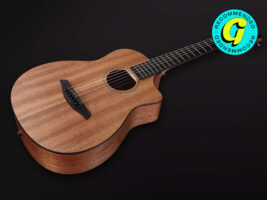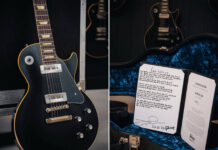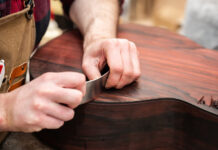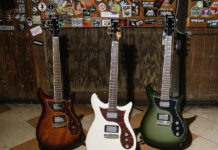
Furch Pioneer MM Review: “the biggest compliment that you can give to a travel guitar is that it doesn’t feel like one”
$1,092/£849, furchguitars.com
The thought of heading off on vacation or a work trip without being able to lay your hands on a guitar is a wrench for many players, and that’s why in the last few decades, the concept of the travel guitar has become increasingly popular.
Having owned and played many travel instruments in the past, the challenge is to create a portable guitar that is just as playable as your full-sized instrument, sounds close to as big and doesn’t look or feel like a toy. It also needs to stay in tune and it must make you want to play it – otherwise what’s the point of taking it with you?
READ MORE: Taylor Gold Label 517e review – “this is the most sonically compelling Taylor guitar I’ve ever played”
That’s quite a challenge for something that also has to be able to be stowed in an overhead locker or in the back of the car. To get around this, sometimes these guitars include elaborate and often slightly terrifying means of collapsing or folding them up to make them compact for travel.
Others, Martin’s Backpacker perhaps being the most extreme example, simply try to scale down a standard guitar as much as possible without having to make you lean heavily on the skills you learned as a kid playing with Transformers.
This latest example from Czech guitar maker Furch is more towards the latter end of that duality, but with some lessons learned from the former – let’s take a closer look at the Pioneer MM.
Image: Press
Furch Pioneer MM – what is it?
Furch makes a bunch of different travel guitars, and the brand’s Little Jane models are of the type that break down the neck in such a way that you can fit the whole thing into a backpack.
The Pioneer however, is designed to stay all in one piece – making it a little less easily stowable but more reassuring if the thought of reassembling your guitar at the other end of a flight gives you the willies.
The Pioneer is ever so slightly larger than the Little Jane – though still very compact – with a body width of 322mm, a body length of 432mm and an overall strap button to peghead length of 932mm. The depth of the body is the same 102mm as the LJ.
The Pioneer is an all-solid wood affair – in this case the MM designates that it’s all African mahogany, though cedar and spruce tops are also available, as is a classic spruce/rosewood configuration.
Like most travel guitars, the Pioneer has a slightly shortened 615mm scale length, and a 14-fret body join – but elsewhere the guitar is stacked with features designed to ensure that this doesn’t feel quite so much like a compromise in terms of tone and playability.
Most notable is the presence of Furch’s CNR System Active neck joint. This involved piece of engineering features a wooden ‘expansive element’ in the neck block that, so Furch says, means that the guitar can adapt to rapid changes in temperature and humidity without impacting the playability and intonation of the instrument.
Given its purpose as a guitar that will be rapidly moving from one climate to another, often via the none-more-dry environment of an airplane cabin, you can see why this will be a valuable addition.
In order to make things sound a little bigger than its compact dimensions might attest, there’s also an innovative ‘Booster Soundport’ – effectively five 1.5-inch lines cut out of the upper shoulder. The BS – their abbreviation not mine! – is that this delivers more of the sound of the guitar directly to the player’s ears and makes it feel bigger than it might otherwise.
There’s also an optional suite of LR Baggs electronics on board should you wish to plug into an amp or PA while on your travels.
Image: Press
Furch Pioneer MM – feel and sounds
You never really know how a travel guitar is going to feel and sound until you get into it – it’s rare that there aren’t some compromises along the way, but the impressive thing here is how well Furch has managed to minimise those.
The scale length is shorter than a full-sized acoustic of course, but it’s not so short that you feel like you’re playing a toy. It certainly helps that the neck is a lovely V-shape with beautifully rounded frets and no sharp edges. The open-pore finish also helps this guitar feel more comfortable and connected when you play it.
Sonically, it definitely sounds bigger than it has any right to when played seated – probably in part down to the Booster Soundport, but also the thin finish allowing the guitar to vibrate more fully. It’s these little details that set the guitar apart from other travel guitars I’ve tried.
There’s no doubt that it doesn’t have the bass response that you’d expect from a full-size – no doubt in part because of that cutaway – but what you lose there you gain in upper fret access. And such is the playability and ease of access with the Pioneer, it does inspire you to venture north more readily than you would normally.
The all-mahogany construction provides that warmth and even notation from the first strum, though some players will want more midrange frequencies – if that’s you, then the spruce or cedar-topped models are probably for you.
The tradeoff is that those guitars will probably take a while to really open up, as is the case with most solid wood acoustics, but I prefer the warmth and even notation out of the box that this all-mahogany guitar offers.
I can’t imagine the majority of players will need or want to plug this into an amp or PA – the whole purpose of a travel guitar is to strip things down to the basics, surely? That being said, the LR Baggs onboard electronics do a perfectly fine job of adding depth and warmth to the sound when hooked up to an amp.
Image: Press
Furch Pioneer MM – should I buy one?
The biggest compliment that you can give to a travel guitar is that it doesn’t feel like one when you’re sitting there and strumming. In fact, forget about travelling, I’d have no issues taking this guitar to a songwriter round or a jam session, plugging in and playing all night – this is not just a great travel guitar, it’s a great acoustic guitar full stop.
Okay it’s not as compact as some travel guitars, but it offers a full compact experience without any of the compromises that those ultra-compact guitars often require. It’s quite expensive for a travel guitar, but it’s worth remembering that this is an all-solid, hand-crafted instrument that’s made to very high standards – and it comes with a nicely padded gigbag with a wealth of functional pockets to store your picks, tuners and the like in. It’s not the cheapest, but it’s one of the very best.
Furch Pioneer MM – alternatives
The undisputed king of the small-bodied travel acoustics is the Taylor GS Mini, and you can get an all-mahogany version for just $599. It’s not all-solid like the Furch however, but the sound, playability and rugged reliability are the benchmark. Another big contender in this category is Martin’s all-new Junior series, and the all-solid sapele 000 Jr E is a fine guitar with a ‘proper’ 24.9” scale length – it’s another small-bodied acoustic that doesn’t feel small. Ed Sheeran showed the world that travel guitars are just as usable playing coffee shops as they are stadiums, and his Sheeran By Lowden W04 ($897) is a solid spruce/walnut instrument with LR Baggs VTC pickup, designed by modern acoustic genius George Lowden and built in Ireland.
The post Furch Pioneer MM Review: “the biggest compliment that you can give to a travel guitar is that it doesn’t feel like one” appeared first on Guitar.com | All Things Guitar.
Source: www.guitar-bass.net











